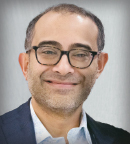Commenting on the AEGEAN study at the 2023 World Conference on Lung Cancer were the abstract’s invited discussant Solange Peters, MD, PhD, Professor and Chair of Medical Oncology and the Thoracic Malignancies Program at Lausanne University Hospital in Switzerland, and Upal Basu Roy, PhD, MPH, Executive Director of Research for the advocacy group LUNGevity (www.lungevity.org), in Chicago.

Solange Peters, MD, PhD

Upal Basu Roy, PhD, MPH
Dr. Peters highlighted the “growing paradigm” for immunotherapy in early-stage resectable non–small cell lung cancer (NSCLC) and noted that for neoadjuvant immunotherapy, in particular, there is a convincing biological and logistical rationale. She explained that neoadjuvant therapy does the following:
- Takes advantage of the higher antigen load and release from dying cells in untreated tumors—all helping to prime the immune system
- Is not impeded by significant clonal evolution or heterogeneity of the tumor; this can yield a better immune response
- Offers a window of opportunity to accurately study the effects of immunotherapy through access to pre- and posttreatment tissue
- Allows for a shorter time frame for completion of clinical trials, especially where there are reliable surrogate endpoints for survival.
AEGEAN in Context
Dr. Peters said the phase III AEGEAN trial joins CheckMate 8161 in evaluating neoadjuvant checkpoint inhibition and KEYNOTE-6712 in evaluating neoadjuvant followed by adjuvant checkpoint inhibition. The event-free survival signal across these three perioperative/neoadjuvant trials is similar, with hazard ratios of 0.68 in AEGEAN, 0.68 in CheckMate 816, and 0.58 in KEYNOTE-671. In all three studies, roughly two-thirds of patients receiving immunotherapy remained event-free.
“This confirms what we were hypothesizing—a very early separation of the curves that is reproducible and consistent across the trials,” Dr. Peters said. “By combining immune checkpoint inhibition and chemotherapy, you improve the pathologic complete response we hope is a surrogate for overall survival.”
The three trials are also consistent in that approximately 20% of patients in each never underwent the intended surgery, for reasons unrelated to immunotherapy.This is unfortunate, she said, since neoadjuvant immunotherapy plus chemotherapy almost universally improve surgical outcomes. In AEGEAN, disease progression was the reason for the canceled surgery in approximately 8% of patients, but 10% to 15% of the time, the cancellation pertained to patient selection. This suggests the recommendation for surgery was probably “not the right choice” for these patients, she said, advocating for careful individualization of treatment for patients with early-stage disease.
Finally, Dr. Peters noted, the lack of the regimen’s benefit in patients with EGFR mutation is in line with the findings of other studies. Although patients with EGFR-mutated disease and positive expression of PD-L1 have sometimes demonstrated a marginal benefit, these subsets are small, and confidence intervals have been wide; therefore, conclusions cannot be drawn, she cautioned.
Clinical Implications
Dr. Roy discussed AEGEAN’s potential impact on clinical practice. “Currently, neoadjuvant chemoimmunotherapy and adjuvant immunotherapy are approved as treatments for early-stage NSCLC and are given in combination with surgery. The positive readouts of the AEGEAN trial with durvalumab and the recent KEYNOTE-671 trial1 leading to the approval of pembrolizumab in this setting suggest that perioperative chemoimmunotherapy may be an additional treatment option for biomarker-negative early-stage NSCLC. It is important to note the AEGEAN regimen did not significantly impact surgery-specific outcomes. Patients and physicians are often concerned about delayed surgery, which can result in cancer progression and upstaging. It is reassuring to see that delays in surgery and starting of adjuvant treatment were not observed in the trial,” he said.
“What is unclear from the AEGEAN data is whether adjuvant durvalumab is still needed in patients whose tumors show a pathologic complete response following neoadjuvant chemoimmunotherapy. It is possible these patients may not need any additional treatment and still remain at low risk of recurrence,” Dr. Roy suggested. “We need better prognostication tools to identify patients who will need additional adjuvant immunotherapy, so those unlikely to benefit are spared from additional treatment and financial toxicities.”
DISCLOSURE: Dr. Peters reported relationships with AbbVie, Amgen, Aacus, AstraZeneca, Bayer, BeiGene, BerGenBio, Biocartis, BioInvent, Blueprint Medicines, Boehringer Ingelheim, Bristol Myers Squibb, Clovis, Daiichi Sankyo, Debiopharm, Eli Lilly, F-Star, Foundation Medicine, Genzyme, Gilead Sciences, GSK, Hutchmed, Illumina, Incyte, Ipsen, iTeos, Janssen, Merck Sharp and Dohme, Merck Serono, Mirati Therapeutics, Novartis, Novocure, PharmaMar, Promontory Therapeutics, Pfizer, Regeneron, Roche/Genentech, Sanofi, Seattle Genetics, Takeda, Vaccibody, AiCME, Fishawack, Genzyme, Gilead Sciences, Imedex, IQVIA, Merrimack, Oncology Education, PER, PeerView, RMEI, RTP, and Galencia. Dr. Roy reported no conflicts of interest.
REFERENCES
1. Forde PM, Spicer J, Lu S, et al: Neoadjuvant nivolumab plus chemotherapy in resectable lung cancer. N Engl J Med 386:1973-1985, 2022.
2. Wakelee H, Liberman M, Kato T, et al: Perioperative pembrolizumab for early-stage non-small-cell Lung cancer. N Engl J Med 389:491-503, 2023.

